

Celtic Religion. Hyperboreans: Myth and History in Celtic-Hellenic Contacts - Timothy Bridgman. Hello there - General Discussion & Ideas - Wildfire Games Community Forums. I am a historian, focused mainly on Irish anthropology, but I do enjoy studying iron age Celts.
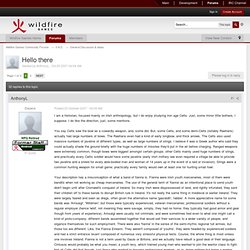
Just, some minor little bothers, I suppose. I do like the direction, just, some mentions. You say Celts saw the bow as a cowardly weapon, and, some did. But, some Celts, and some demi-Celts (notably Raetians) actually had large numbers of bows. The Raetians even had a kind of early longbow, and thick arrows. Your description has a misconception of what a band of fianna is.
Also, there's some misconception of buildings. Also, round houses, no longer common in most of Gaul by 400, pretty much being replaced by rectangular long houses. Farmsteads are different, that's what villages built up around. On Gauls fighting; Gauls carried standards and horns for a reason. Also, while armor would be more rare early in the period you've got (500 BC), by about the mid-100s BC, armor is growing much more common. Some Gallic terminology, dunno if you have this. A new noble rises to his title. Medicine. Hello there - General Discussion & Ideas - Wildfire Games Community Forums - Page 2. Anthony posted on the EB forums quite a bit as two different people.
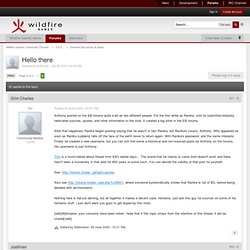
For the first while as Ranika, until he submitted blatantly fabricated sources, quotes, and other information to the mod. It created a big stink in the EB forums. After that happened, Ranika began posting saying that he wasn't in fact Ranika, but Ranika's cousin, Anthony. Who appeared as soon as Ranika suddenly falls off the face of the earth never to return again. With Ranika's password, and the same interests. This is a much-talked about thread from EB's earlier days... See: Also see where someone systematically shows that Ranika is full of BS, before being derailed with ad-hominems. Nothing here is flat-out darning, but all together it makes a decent case. [edit]Wijitmaker: your concerns have been noted - Note that if this topic strays from the intention of this thread, it will be closed[/edit] Gaulish language. Gaulish is an extinct Celtic language that was spoken in parts of France,[1] Germany, Austria, Hungary, and the Swiss Rhine area as late as the Roman period. [2] It is also considered to be epigraphically attested in Belgium and Northern Italy.[3] Gaulish was supplanted by Vulgar Latin and various Germanic languages from around the 5th century AD onwards.
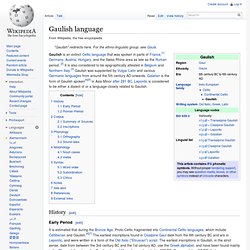
Galatian is the form of Gaulish spoken[4][5] in Asia Minor after 281 BC. Lepontic is considered to be either a dialect of or a language closely related to Gaulish. History[edit] Early Period[edit] It is estimated that during the Bronze Age, Proto-Celtic fragmented into Continental Celtic languages, which include Celtiberian and Gaulish.[6][7] The earliest inscriptions found in Cisalpine Gaul date from the 6th century BC and are in Lepontic, and were written in a form of the Old Italic ("Etruscan") script.
Roman Period[edit] Gallo-Brittonic Language. Pictish language. Pictish is a term used for the extinct language, or dialect, spoken by the Picts, the people of northern and central Scotland in the Early Middle Ages.
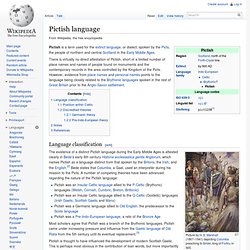
There is virtually no direct attestation of Pictish, short of a limited number of place names and names of people found on monuments and the contemporary records in the area controlled by the Kingdom of the Picts. However, evidence from place names and personal names points to the language being closely related to the Brythonic languages spoken in the rest of Great Britain prior to the Anglo-Saxon settlement. Language classification[edit] Most scholars agree that Pictish was a branch of the Brythonic languages. Pictish came under increasing pressure and influence from the Gaelic language of Dál Riata from the 5th century until its eventual replacement.[3] Pictish is thought to have influenced the development of modern Scottish Gaelic.
Position within Celtic[edit] Discredited theories[edit] Germanic theory[edit] Pre-Indo-European theory[edit] A history of scotland episode 1 " the last of the free" Celts. Diachronic distribution of Celtic peoples: core Hallstatt territory, by the 6th century BC maximal Celtic expansion, by 275 BC Lusitanian area of Iberia where Celtic presence is uncertain The Celts (/ˈkɛlts/, occasionally /ˈsɛlts/, see pronunciation of Celtic) or Kelts were an ethnolinguistic group of tribal societies in Iron Age and Medieval Europe who spoke Celtic languages and had a similar culture,[1] although the relationship between the ethnic, linguistic and cultural elements remains uncertain and controversial.
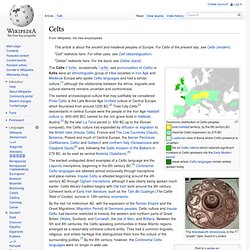
What drove the migration of the Celts? : AskHistorians. Picts. Pictish society was typical of many Iron Age societies in northern Europe, having "wide connections and parallels" with neighbouring groups.[2] Archaeology gives some impression of the society of the Picts.
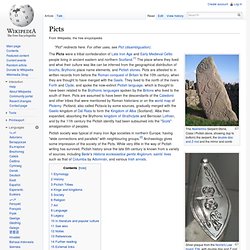
While very little in the way of Pictish writing has survived, Pictish history since the late 6th century is known from a variety of sources, including Bede's Historia ecclesiastica gentis Anglorum, saints' lives such as that of Columba by Adomnán, and various Irish annals. Etymology[edit] What the Picts called themselves is not yet known.
[nb 1] The Latin word Picti first occurs in a panegyric written by Eumenius in AD 297 and is taken to mean "painted or tattooed people" (from Latin pingere "to paint";[3] pictus, "painted", cf. Greek "πυκτίς" - pyktis, "picture").[4] As Sally M. History[edit] A Pictish confederation was formed in Late Antiquity from a number of tribes—how and why is not known. Questions about the Celts and blue war paint. : AskHistorians. CELTIC HISTORY; BRIEFLY... "The Celts were a southern European people of Indo-Aryan origin who first surfaced in Bohemia and travelled west in search of the home of the sun.
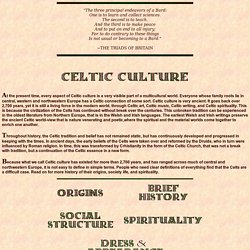
Science has recently established their basic blood group as 'O', in keeping with their modern descendants, which designates them as a seperate race from the aboriginals of the sourthern Indian subcontinent, where the 'B' blood group perdominates. History tells us that there were two main Celtic groups, one of which is referred to as the 'lowland Celts' who hailed from the region of the Danube. These people left their native pastures around 1200 BC and slowly made their way across Europe, founding the lake dwellings in Switzerland, the Danube valley and Ireland.
They were skilled in the use of metals and worked in gold, tin and bronze. Unlike the more familiar Celtic strain these people were an agriculturally oriented race, being herdsmen, tillers and artificers who burned rather than buried their dead. However. Watch A History Of Celtic Britain Serie Online. List of English words of Gaulish origin. A list of English Language words derived from the Celtic Gaulish language, entering English via Old Frankish or Vulgar Latin and Old French ambassador from Old French embassadeur, from Latin ambactus, from Gaulish *ambactos, "servant", "henchman", "one who goes about". beak.
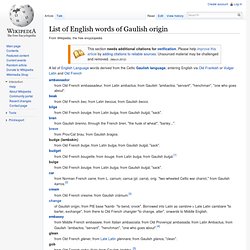
S Druidism - Envoking Spiritual Thought - Celtic Words & Terms.